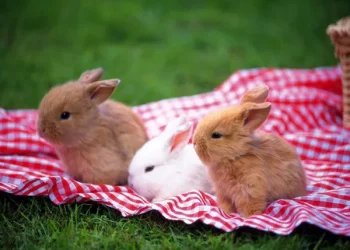Rabbits are among the most beloved and popular pets worldwide. With their fluffy fur, long ears, and big, expressive eyes, rabbits can make wonderful companions. As responsible pet owners, we often wonder about what we can feed our rabbits to keep them healthy and happy. While many of us enjoy sharing a bite of fruit with our pets, we might wonder, “Can you feed rabbits apples?” Apples are a popular and tasty fruit among humans, but is it safe for rabbits? In this article, we will explore the nutritional needs of rabbits, whether apples are a suitable treat, and how to feed apples to your rabbit properly.
1. Understanding a Rabbit’s Diet
Before we dive into the specifics of apples and their effects on rabbits, it’s important to understand the general dietary needs of rabbits. Rabbits are herbivores, which means they rely entirely on plant-based foods for nutrition. Their diet in the wild consists mostly of grass, hay, leaves, and occasionally some fruits and vegetables. A proper diet for a pet rabbit should closely resemble what they would eat in the wild.
Rabbits require a high-fiber diet to maintain healthy digestion and prevent common health issues like obesity, GI stasis (a condition where the gut stops moving), and dental problems. This fiber comes mainly from hay, which should make up the majority of a rabbit’s diet. High-quality hay such as timothy hay, oat hay, or meadow hay should be available to your rabbit at all times.
Fresh vegetables and leafy greens, like romaine lettuce, cilantro, parsley, and kale, also play an essential role in their diet. These provide important nutrients and hydration, as they are rich in water content. However, fruits, including apples, should be offered sparingly because of their higher sugar content, which may not be ideal for a rabbit’s health in large amounts.
2. The Nutritional Value of Apples
Apples are delicious and nutrient-rich fruits, but how do they measure up when it comes to the nutritional needs of rabbits? Let’s break down the main components of apples and assess their suitability for rabbits:
Water Content: Apples have a high water content (about 85%), which makes them a hydrating snack for rabbits. This is beneficial, especially if you’re feeding your rabbit fruits like apples in moderation. Hydration is important for preventing urinary tract issues and maintaining overall health.
Carbohydrates and Sugar: Apples contain a significant amount of sugar, especially natural sugars like fructose and glucose. A medium-sized apple contains about 19 grams of sugar. While the sugar in apples is natural, it’s still important to note that rabbits’ digestive systems are not designed to handle high amounts of sugar. High sugar intake can contribute to obesity, dental issues, and gastrointestinal problems like diarrhea.
Fiber: Apples contain some fiber, but not as much as other rabbit foods like hay and leafy greens. Fiber is essential for a rabbit’s digestive system, and although apples do contribute a small amount, they are not a primary source of fiber for rabbits.
Vitamins and Minerals: Apples are rich in vitamin C, potassium, and antioxidants. However, rabbits don’t require vitamin C supplementation as humans do, as they can produce this vitamin on their own. Potassium is beneficial for muscle and nerve function, but it’s not essential for rabbits to get from apples, as they can obtain this mineral from other vegetables like leafy greens.
3. Can Apples Be Beneficial for Rabbits?
While apples are not a necessary part of a rabbit’s diet, they can still provide some health benefits when offered in moderation. Here are some of the positive aspects of feeding apples to rabbits:
Hydration: The high water content in apples can help keep your rabbit hydrated, especially if they are not drinking enough water or eating enough fresh vegetables. This can be helpful during warmer weather when your rabbit might need extra hydration.
Dental Health: Like many fruits, apples have a crunchy texture that can help clean your rabbit’s teeth as they chew. This may help promote better dental health, but it is not a substitute for providing hay, which is the primary food that helps wear down a rabbit’s teeth and prevent overgrowth.
A Treat for Variety: Apples, when offered in moderation, can provide a welcome variety to your rabbit’s diet. They are tasty and aromatic, which can make them an exciting and rewarding treat. Providing different flavors and textures to your rabbit’s diet can keep them engaged and satisfied.
4. The Risks of Feeding Apples to Rabbits
Despite the potential benefits of apples, there are several risks and concerns to be aware of when feeding apples to rabbits. It is essential to understand these risks to ensure that apples don’t cause any harm to your pet.
High Sugar Content: As mentioned earlier, apples are high in natural sugars. While small amounts of sugar are generally harmless, excessive sugar intake can lead to several health problems for rabbits, including obesity, gastrointestinal upset, and diabetes. Rabbits’ digestive systems are not designed to handle the sugar load found in fruits like apples, so it’s important to limit their consumption of sugary foods.
Obesity: Rabbits are prone to weight gain if they are overfed sugary or calorie-dense treats. Excessive apple consumption can contribute to obesity, which can have serious consequences for a rabbit’s health, including reduced mobility, heart disease, and a shorter lifespan. If you decide to feed your rabbit apples, it’s important to consider the overall calorie intake and maintain a balanced diet.
Digestive Issues: Introducing new foods, especially high-sugar fruits, can cause digestive issues in rabbits. Too many apples may lead to diarrhea, bloating, or gas, all of which can be uncomfortable and potentially harmful to your rabbit’s digestive system. When feeding apples or any other fruit, it’s important to monitor your rabbit’s reaction and reduce the amount if any digestive issues arise.
Choking Hazard: Apples, especially the core, contain seeds that can be harmful to rabbits. The seeds contain cyanide, a toxic substance that can cause poisoning in large amounts. While a rabbit would have to consume a significant number of apple seeds for this to be a real threat, it’s important to remove the seeds and the core before offering apple slices to your rabbit. Even the skin should be peeled in some cases, especially for sensitive rabbits.
Tooth Damage: While apples are generally not too hard to chew, some rabbits may experience tooth problems from eating too many apples or other hard foods. Eating apples with excessive frequency may contribute to tooth decay or overgrowth, especially if the rest of their diet does not provide sufficient fiber.
5. How to Safely Feed Apples to Rabbits
If you decide that apples can be a part of your rabbit’s diet, it is important to offer them safely and appropriately. Here are some tips on how to feed apples to rabbits:
Moderation is Key: Apples should only be fed as an occasional treat and not as a regular part of your rabbit’s daily diet. Too much fruit can quickly lead to health problems, so stick to small, manageable portions.
Remove Seeds and Core: Always remove the apple seeds and the core before feeding the apple to your rabbit. The seeds contain harmful cyanide, which can be toxic to rabbits in larger quantities.
Cut into Small Pieces: Cut the apple into small, bite-sized pieces to make it easier for your rabbit to eat and digest. This will also help minimize the risk of choking.
Wash the Apple Thoroughly: Always wash the apple thoroughly to remove any pesticides or chemicals that may be present on the skin. Even organic apples should be cleaned well to ensure they are safe for your rabbit.
Observe for Digestive Issues: After introducing apples to your rabbit’s diet, monitor them for any signs of digestive upset, such as diarrhea or gas. If your rabbit shows signs of discomfort, reduce the amount of apple or discontinue offering it altogether.
Offer Apples as Part of a Balanced Diet: Apples should never replace hay or leafy greens, which should always be the primary components of a rabbit’s diet. Use apples as a special treat in combination with other healthy foods.
6. Alternative Treats for Rabbits
If you’re looking for other treats to offer your rabbit in place of apples, there are plenty of safe and healthy options. Some fruits and vegetables can be good alternatives to apples, but they too should be given in moderation. Here are some other treat options for your rabbit:
Carrots (in moderation) – Carrots are a great snack for rabbits and are high in vitamin A. However, they are also relatively high in sugar, so feed them in moderation.
Berries (such as strawberries, raspberries, or blueberries) – These fruits are lower in sugar compared to apples and offer antioxidants, making them a great occasional treat.
Bananas (in moderation) – Bananas are higher in sugar but can be offered occasionally as a tasty treat.
Herbs (such as cilantro, parsley, and basil) – Fresh herbs can be a nutritious and refreshing treat for your rabbit.
Leafy greens (such as spinach, dandelion greens, and arugula) – These are an excellent and nutritious option to feed your rabbit as part of their regular diet.
Conclusion
In conclusion, apples can be a safe and enjoyable treat for rabbits when fed in moderation. While they provide hydration, some vitamins, and a crunchy texture that can help keep teeth healthy, they also come with risks, particularly due to their high sugar content. Overfeeding apples can lead to digestive issues, obesity, and other health concerns. Always remember to remove the seeds and core before offering apple slices, and cut the fruit into small pieces to prevent choking.
A rabbit’s primary diet should consist of hay, fresh vegetables, and leafy greens, with fruits like apples being offered only occasionally and in small portions. By following these guidelines, you can safely incorporate apples into your rabbit’s diet while maintaining their health and well-being. If you’re ever uncertain about feeding a particular food to your rabbit, it’s always a good idea to consult with a veterinarian who specializes in small animals to ensure your pet stays healthy and happy.
Related Topics:

























